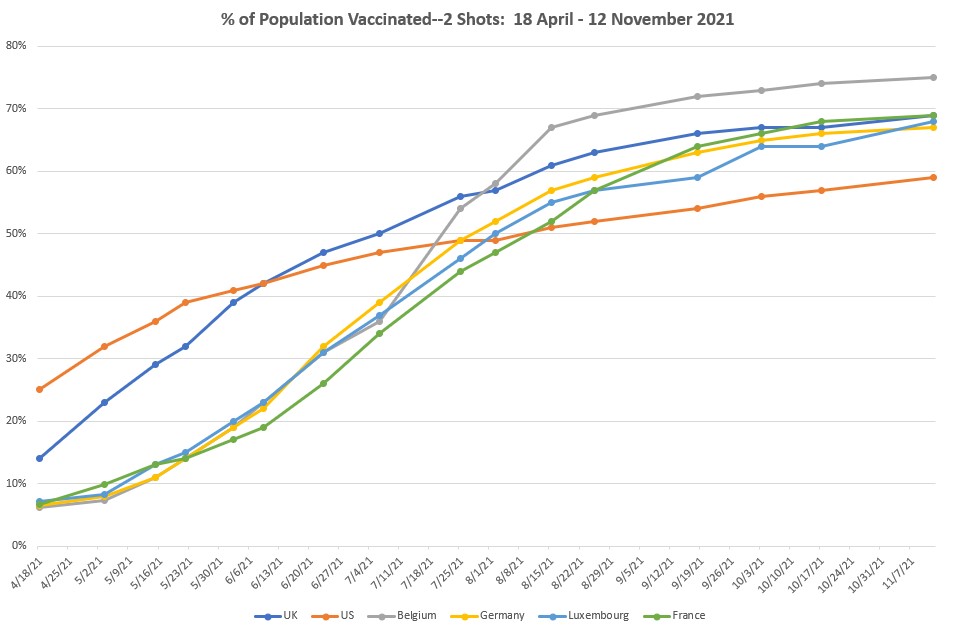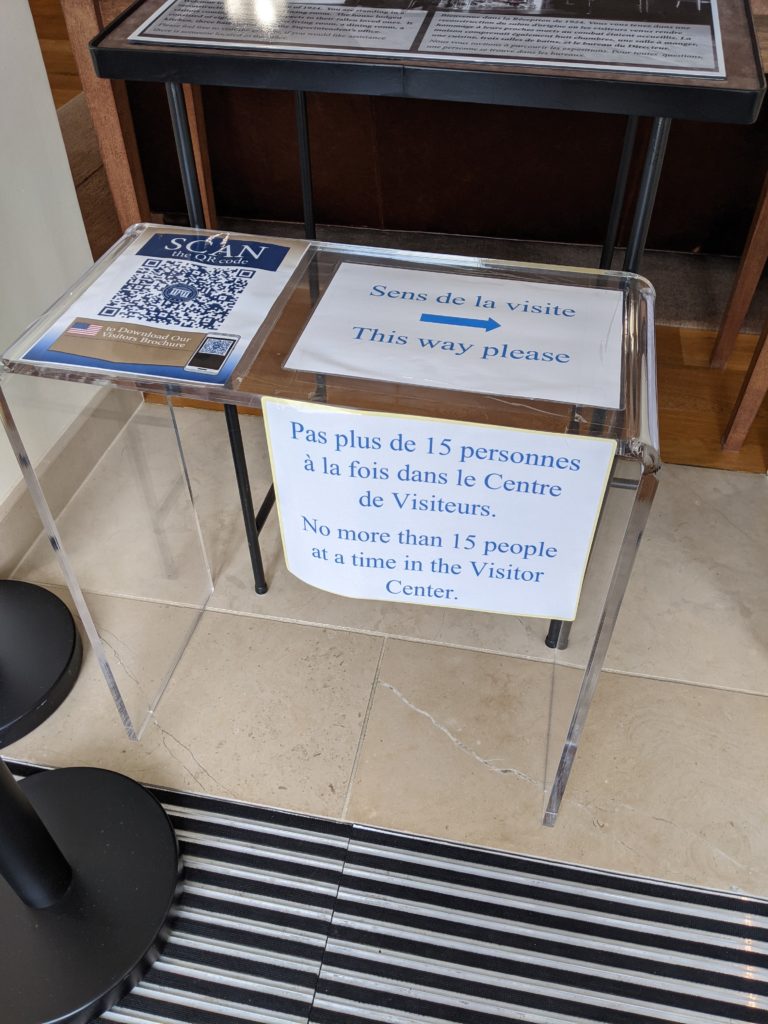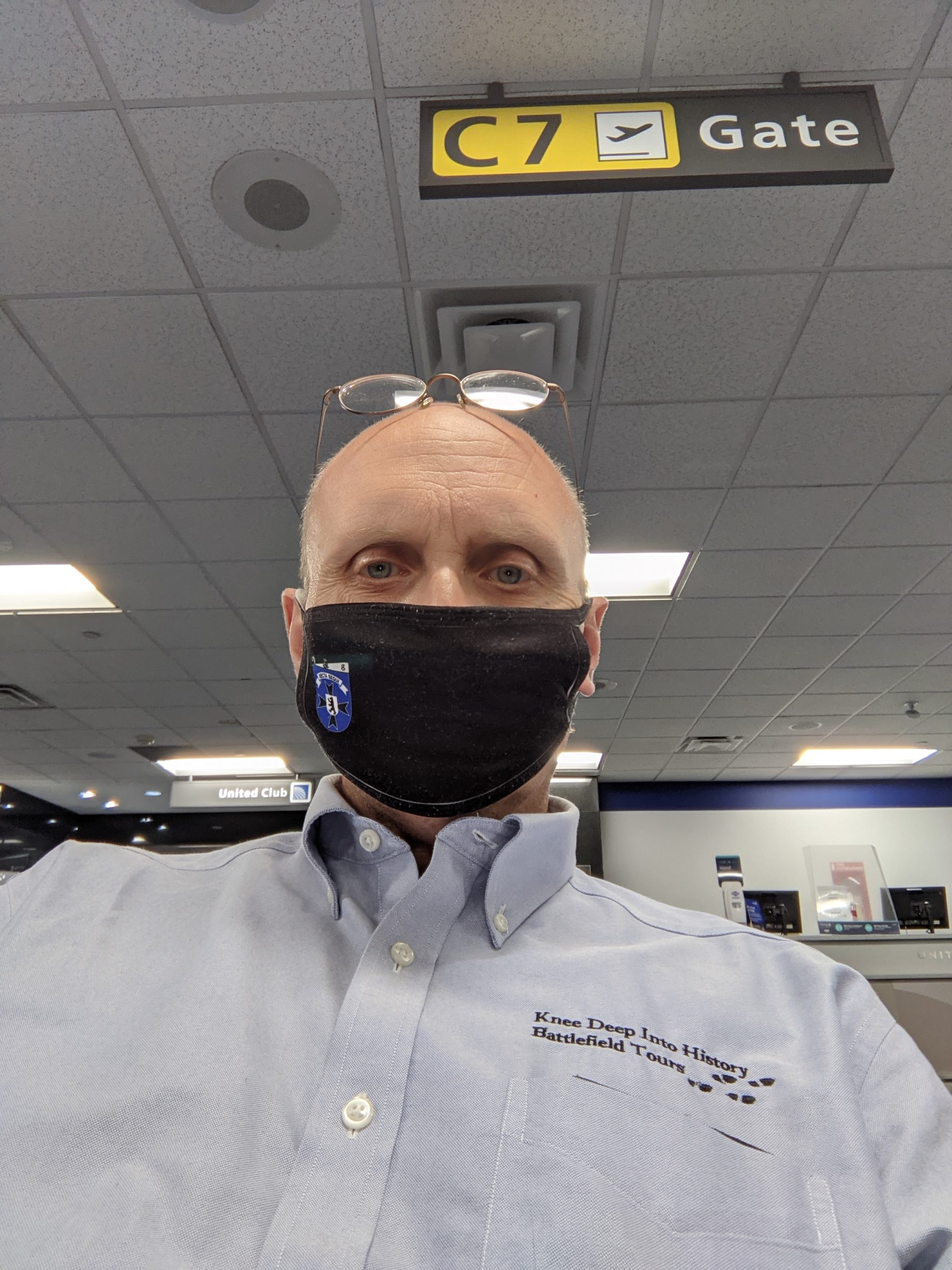At Knee Deep Into History, LLC we endeavor to provide our clients and friends with useful travel information, whether they travel with us, another tour group or independently. Since our two successful tours in September 2021 (Meuse-Argonne and St. Mihiel and Ardennes Offensive), scores of people have asked about my travel experience to several Western European countries. Here is a collection of thoughts on the subject that I hope readers will find helpful:
A short history beginning in Summer 2021. In May 2021 the EU countries signed an agreement to begin reducing restrictions on non-essential travel. It started with reducing restrictions between EU countries and it continued with reducing travel restrictions for non-EU countries. Countries were color-coded green, yellow or red; generally depending largely on the prevalence of new cases. The U.S. was initially color-coded Green because, at that time, it had a higher percentage of adults vaccinated—relative to European countries. As a result, U.S. citizens resumed non-essential travel to EU countries in June / July 2021.
Since that time, U.S. rates have continued to spike, and many Western European country vaccination rates have overtaken U.S. rates. As a result, the U.S. is now considered an orange or red country or a very-high risk country.
Vaccination rates for six countries are shown in the graph below. And one can see THAT WESTERN EUROPEAN VACCINATION ARES ARE NOW CONSIDERABLY HIGHER THAN U.S. VACCINATION RATES.

The European Union is not United. Under the reopening framework, each EU country establishes its own entry and in-country safety requirements. Therefore, travelers planning to travel to Europe must understand the current regulations in each country they desire to visit. THIS CAN BE FOUND BY SEARCHING ON COVID-19 TRAVEL REQUIREMENTS FOR EACH COUNTRY OF INTEREST. TRAVELERS SHOULD USE THE OFFICAL GOVERNMENT COVID-19 INFORMATION FROM THAT COUNTRY AS THEIR PRIMARY SOURCE OF INFORMATION.
Newspaper articles, reports from individuals who have traveled there recently, etc. can provide color too. But remember that it is the foreign government that sets the rules.
Things are always changing, so stay on top of the government guidance (first) and the news (second.) As I write this, cases are surging in Europe again. In Western Europe the high vaccination rate is lessening severe cases and hospitalizations. In Eastern Europe the low vaccination rate is stressing the healthcare systems. The Netherlands has just implemented a partial lockdown for three weeks to curb cases and Austria is implementing a lockdown for its unvaccinated citizens.
While staying on top of the news, take advantage of locals and successful travelers. On of Knee Deep Into History’s big advantages was having tour guide Markus Klauer on the ground in France, and having other connections with Europeans and early American travelers when Europe re-opened in summer 2021.
The big trend is towards vaccination, including a booster, in the EU and in the U.S. Don’t try to travel internationally if unvaccinated. Using France as an example: If one is fully vaccinated—as outlined in the French government website below—one can travel to France with virtually no restrictions. If one is not fully vaccinated, it appears that the U.S. is currently coded orange. Unvaccinated individuals trying to travel from orange countries may only enter France for “pressing grounds” i.e. essential travel. One will need a negative PCR test to enter the country. One might be subject to a random test upon arrival, and one must pledge to self-isolate for seven days.
Don’t worry, France is making it tougher on their unvaccinated citizens too—just as the U.S. has been doing. In August 2021 +/- France implemented a “Pass Sanitaire” that requires people to show they are vaccinated in order to dine out, visit museums, stay in hotels and ride public transit.
Austria has just implemented a lockdown for its unvaccinated citizens—an interesting twist to pushing its citizens to get vaccinated. The unvaccinated will only be permitted to leave the home for work, shopping and certain other reasons.
If one can get a European vaccination certificate, do it. Getting a vaccination certificate from an EU country, if possible, gives the locals more confidence than just showing an American CDC vaccination card. That said, when I first arrived in France, I did not have my Pass Sanitaire, and I had no problem showing my US CDC card to enter a restaurant.
France had a system set up whereby travelers could apply for a Pass Sanitaire before traveling to France by uploading documents. One news site suggested that it was taken down in Early November and individuals must now go to a local pharmacy once they arrive in France. This was confirmed by the U.S. Embassy information in the link below.
How to Get a French Health Pass – U.S. Embassy & Consulates in France (usembassy.gov)
A big risk is re-entry into the United States. The CDC requires a negative Covid-19 PCR test before allowing citizens back into and visitors into the United States. The timing of this PCR test is dependent on one’s vaccination status, as outlined in the link below.
Requirement for Proof of Negative COVID-19 Test or Documentation of Recovery from COVID-19 | CDC
There are various ways to get the test. I purchased a test kit in advance and took it with me, completing it on-line in a hotel before flying back. One can also arrange a test locally or in the airport.
The CDC reentry test requirement poses one of the greatest travel risks.
I believe that partial lockdowns will continue; but full lockdowns are becoming less likely because of increasing vaccination rates. As mentioned above, the Netherlands just adopted a three-week (initial) partial lockdown in an effort to curb cases. Restaurants and non-essential stores will be required to close earlier than normal, and other limitations on large gatherings are being put in place. Austria has just implemented a lockdown for its unvaccinated citizens.
We have already seen several Covid-19 variations in the few short years it has existed. I believe additional variations can be expected; and proof of booster vaccinations could become a travel requirement too. This is speculation on my part; but it is a natural extension of efforts to push citizens to get vaccinated. Even if not required by governments, travelers in higher risk groups should be immunized as strongly as possible.
Understand what costs one can exit without penalty if events head south. Travelers should be certain they can get a refund or re-booking for the plane ticket, hotel room and rental car. The same is true for understanding penalties when cancelling participation in a tour.
The ability to cancel on short notice, if events required it, is one of the primary reasons we did not cancel our 2021 tours.
If one purchases travel insurance, read the coverage carefully. I have always been a bit leery of travel insurance offered in the United States because of horror stories about non-coverage and about delays in payments. Good advice is to have someone with a lawyer’s mind read the policy for the travel insurance before purchasing. Asking “What can go wrong?” upfront, could save a lot of frustration later.
There are not police on every border crossing or on every street corner–now. When France first implemented its lockdowns in early 2020, residents were allowed one hour to go shopping, exercise, etc. They had to fill in paperwork indicating when they left their house and where they were going. Gendarmes were traveling through the small communities checking on paperwork.
During my thirty-five day stay in Europe in September and October I visited France, Belgium, Luxembourg and Germany and never ran across a border patrol or a policeman on the street asking to see my vaccination status. (I even rented an AirBnB room from a police investigator working in Spa, Belgium.)
That said, the European legal system is not the U.S. legal system. Fines can be substantial and playing the dumb American is unlikely to lessen the penalty. American travelers need to be mindful of that if they decide to skirt the rules. One simple example: Crossing a border just for a day to go see something—without filling out a visitor’s statement required by the country being visited. A second example is skipping any required self-quarantine time.
Again, we hope you find these comments helpful. We will be publishing our 2022 tour schedule by the end of November. Individuals who would like to receive more information on travel tips, our online battlefield seminars and our battlefield tours can send their name, state, country and email to lavarennes@meuse-argonne.com to be added to the mailing list.
As always, we hope to get knee deep into history with you in the coming year!
Regards,
Randy Gaulke

#kneedeepintohistory #kdih #battlefieldtours #ww1tours #ww2tours

Randy: All good advice. I had similar experiences in Italy.
John
Thanks Randy. Terrific information.